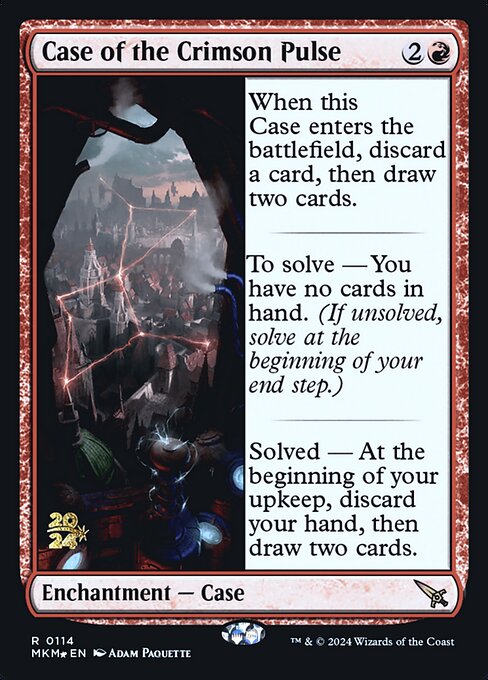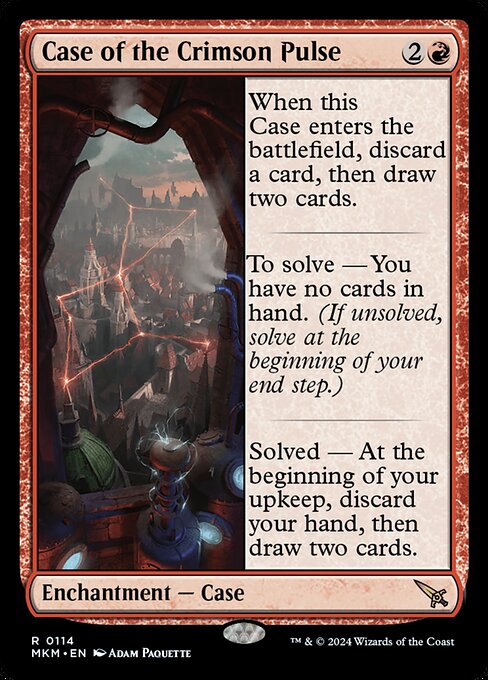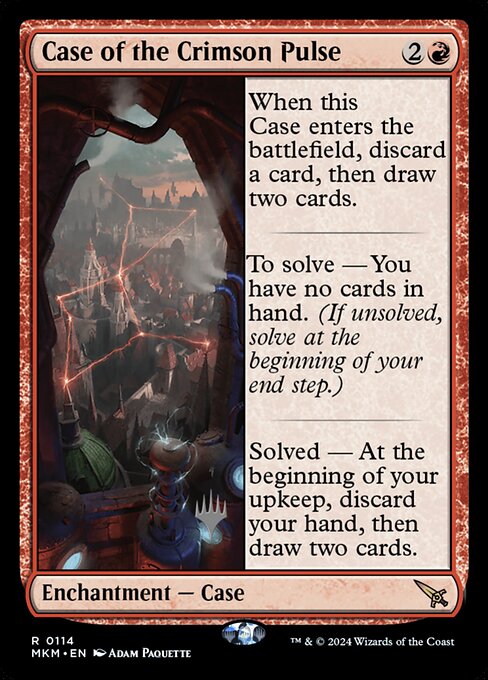Caso do Pulso Carmesim
Encantamento — Caso
Quando este Caso entrar no campo de batalha, descarte um card e depois compre dois cards.
Para Solucionar — Você não tem nenhum card na mão. (Se o Caso não tiver sido solucionado, solucione-o no início de sua etapa final.)
Solucionado — No início de sua manutenção descarte sua mão e depois compre dois cards.
Para Solucionar — Você não tem nenhum card na mão. (Se o Caso não tiver sido solucionado, solucione-o no início de sua etapa final.)
Solucionado — No início de sua manutenção descarte sua mão e depois compre dois cards.
standard
future
historic
gladiator
pioneer
explorer
modern
legacy
pauper
vintage
penny
commander
brawl
alchemy
paupercommander
duel
oldschool
premodern
Rulings
Each Case has two special keyword abilities: to solve and solved.
If you have no cards in hand as Case of the Crimson Pulse’s first ability resolves, you won’t discard a card, but you will still draw two cards. Similarly, if you have no cards in hand when Case of the Crimson Pulse’s last ability resolves, you won’t discard any cards, but you’ll still draw two cards.
Once a Case becomes solved, it stays solved until it leaves the battlefield.
Cases don’t lose their other abilities when they become solved.
The meaning of “solved” differs based on what type of ability follows it. “Solved — [activated ability]” means “[Activated ability]. Activate only if this Case is solved.” Activated abilities contain a colon. They’re generally written “[Cost]: [Effect].”
“Solved — [static ability]” means “As long as this Case is solved, [static ability].” Static abilities are written as statements, such as “Creatures you control get +1/+1” or “Instant and sorcery spells you cast cost less to cast.”
Being solved is not part of a permanent’s copiable values. A permanent that becomes a copy of a solved Case is not solved. A solved Case that somehow becomes a copy of a different Case stays solved.
“Solved — [Triggered ability]” means “[Triggered ability]. This ability triggers only if this Case is solved.” Triggered abilities use the word “when,” “whenever,” or “at.” They’re often written as “[Trigger condition], [effect].”
“To Solve — [condition]” means “At the beginning of your end step, if [condition] and this Case is not solved, it becomes solved.”
“To solve” abilities will check for their condition twice: once when the ability would trigger, and once when it resolves. If the condition isn’t true at the beginning of your end step, the ability won’t trigger at all. If the condition isn’t true when the ability resolves, the Case won’t become solved.
If you have no cards in hand as Case of the Crimson Pulse’s first ability resolves, you won’t discard a card, but you will still draw two cards. Similarly, if you have no cards in hand when Case of the Crimson Pulse’s last ability resolves, you won’t discard any cards, but you’ll still draw two cards.
Once a Case becomes solved, it stays solved until it leaves the battlefield.
Cases don’t lose their other abilities when they become solved.
The meaning of “solved” differs based on what type of ability follows it. “Solved — [activated ability]” means “[Activated ability]. Activate only if this Case is solved.” Activated abilities contain a colon. They’re generally written “[Cost]: [Effect].”
“Solved — [static ability]” means “As long as this Case is solved, [static ability].” Static abilities are written as statements, such as “Creatures you control get +1/+1” or “Instant and sorcery spells you cast cost less to cast.”
Being solved is not part of a permanent’s copiable values. A permanent that becomes a copy of a solved Case is not solved. A solved Case that somehow becomes a copy of a different Case stays solved.
“Solved — [Triggered ability]” means “[Triggered ability]. This ability triggers only if this Case is solved.” Triggered abilities use the word “when,” “whenever,” or “at.” They’re often written as “[Trigger condition], [effect].”
“To Solve — [condition]” means “At the beginning of your end step, if [condition] and this Case is not solved, it becomes solved.”
“To solve” abilities will check for their condition twice: once when the ability would trigger, and once when it resolves. If the condition isn’t true at the beginning of your end step, the ability won’t trigger at all. If the condition isn’t true when the ability resolves, the Case won’t become solved.
Rulings
Each Case has two special keyword abilities: to solve and solved.
If you have no cards in hand as Case of the Crimson Pulse’s first ability resolves, you won’t discard a card, but you will still draw two cards. Similarly, if you have no cards in hand when Case of the Crimson Pulse’s last ability resolves, you won’t discard any cards, but you’ll still draw two cards.
Once a Case becomes solved, it stays solved until it leaves the battlefield.
Cases don’t lose their other abilities when they become solved.
The meaning of “solved” differs based on what type of ability follows it. “Solved — [activated ability]” means “[Activated ability]. Activate only if this Case is solved.” Activated abilities contain a colon. They’re generally written “[Cost]: [Effect].”
“Solved — [static ability]” means “As long as this Case is solved, [static ability].” Static abilities are written as statements, such as “Creatures you control get +1/+1” or “Instant and sorcery spells you cast cost less to cast.”
Being solved is not part of a permanent’s copiable values. A permanent that becomes a copy of a solved Case is not solved. A solved Case that somehow becomes a copy of a different Case stays solved.
“Solved — [Triggered ability]” means “[Triggered ability]. This ability triggers only if this Case is solved.” Triggered abilities use the word “when,” “whenever,” or “at.” They’re often written as “[Trigger condition], [effect].”
“To Solve — [condition]” means “At the beginning of your end step, if [condition] and this Case is not solved, it becomes solved.”
“To solve” abilities will check for their condition twice: once when the ability would trigger, and once when it resolves. If the condition isn’t true at the beginning of your end step, the ability won’t trigger at all. If the condition isn’t true when the ability resolves, the Case won’t become solved.
If you have no cards in hand as Case of the Crimson Pulse’s first ability resolves, you won’t discard a card, but you will still draw two cards. Similarly, if you have no cards in hand when Case of the Crimson Pulse’s last ability resolves, you won’t discard any cards, but you’ll still draw two cards.
Once a Case becomes solved, it stays solved until it leaves the battlefield.
Cases don’t lose their other abilities when they become solved.
The meaning of “solved” differs based on what type of ability follows it. “Solved — [activated ability]” means “[Activated ability]. Activate only if this Case is solved.” Activated abilities contain a colon. They’re generally written “[Cost]: [Effect].”
“Solved — [static ability]” means “As long as this Case is solved, [static ability].” Static abilities are written as statements, such as “Creatures you control get +1/+1” or “Instant and sorcery spells you cast cost less to cast.”
Being solved is not part of a permanent’s copiable values. A permanent that becomes a copy of a solved Case is not solved. A solved Case that somehow becomes a copy of a different Case stays solved.
“Solved — [Triggered ability]” means “[Triggered ability]. This ability triggers only if this Case is solved.” Triggered abilities use the word “when,” “whenever,” or “at.” They’re often written as “[Trigger condition], [effect].”
“To Solve — [condition]” means “At the beginning of your end step, if [condition] and this Case is not solved, it becomes solved.”
“To solve” abilities will check for their condition twice: once when the ability would trigger, and once when it resolves. If the condition isn’t true at the beginning of your end step, the ability won’t trigger at all. If the condition isn’t true when the ability resolves, the Case won’t become solved.
Votre collection ? vos decks ?
Envie de gérer votre collection et/ou créer des decks ?



 0
0
 0.32€
0.32€
